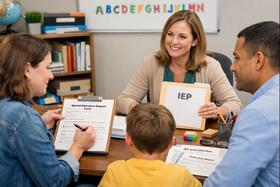Seventy-First High School is a high school located in Fayetteville, North Carolina. It was formed by the consolidation of six schools in 1924.
Serving 1,360 students in grades 9-12, Seventy-first High School ranks in the bottom 50% of all schools in North Carolina for overall test scores (math proficiency is bottom 50%, and reading proficiency is bottom 50%).
The percentage of students achieving proficiency in math is 30-34% (which is lower than the North Carolina state average of 51%). The percentage of students achieving proficiency in reading/language arts is 46% (which is lower than the North Carolina state average of 50%).
The student-teacher ratio of 18:1 is higher than the North Carolina state level of 15:1.
Minority enrollment is 92% of the student body (majority Black), which is higher than the North Carolina state average of 57% (majority Black).
Quick Facts (2026)
- Grades: 9-12
- Enrollment: 1,360 students
- Student-Teacher Ratio: 18:1
- Minority Enrollment: 92%
- Graduation Rate: 82% (Btm 50% in NC)
- Overall Testing Rank: Bottom 50%
- Math Proficiency: 30-34% (Btm 50%)
- Reading Proficiency: 46% (Btm 50%)
- Science Proficiency: 45% (Btm 50%)
- Source: National Center for Education Statistics (NCES), NC Dept. of Education
School Overview
Seventy-first High School's student population of 1,360 students has grown by 5% over five school years.
The teacher population of 77 teachers has declined by 8% over five school years.
Grades Offered
Grades 9-12
(Supplemental Virtual)
(Supplemental Virtual)
Total Students
1,360 students
Gender %
Total Classroom Teachers
77 teachers
Year Founded
1924
School Calendar
School Rankings
Seventy-first High School ranks within the bottom 50% of all 2,617 schools in North Carolina (based off of combined math and reading proficiency testing data).
The diversity score of Seventy-first High School is 0.53, which is less than the diversity score at state average of 0.71. The school's diversity has stayed relatively flat over five school years.
Overall Testing Rank
#1785 out of 2617 schools
(Bottom 50%)
(Bottom 50%)
Math Test Scores (% Proficient)
(21-22)30-34%
51%
Reading/Language Arts Test Scores (% Proficient)
46%
50%
Science Test Scores (% Proficient)
45%
63%
Student-Teacher Ratio
18:1
15:1
American Indian
1%
1%
Asian
1%
4%
Hispanic
16%
21%
Black
66%
25%
White
8%
43%
Hawaiian
n/a
n/a
Two or more races
8%
6%
All Ethnic Groups
Graduation Rate
(21-22)82%
86%
Participates in the National School Lunch Program (NSLP)
Yes
Eligible for Free Lunch
68%
68%
Eligible for Reduced Lunch
3%
1%
School Statewide Testing
School District Name
Source: National Center for Education Statistics (NCES), NC Dept. of Education
School Notes
- School Mascot: Falcon
Profile last updated: 02/09/2025
Frequently Asked Questions
What is Seventy-first High School's ranking?
Seventy-first High School is ranked #1785 out of 2,617 schools, which ranks it among the bottom 50% of public schools in North Carolina.
What schools are Seventy-first High School often compared to?
Seventy-first High Schoolis often viewed alongside schools like Westover High School, Douglas Byrd High School by visitors of our site.
What percent of students have achieved state testing proficiency in math and reading?
30-34% of students have achieved math proficiency (compared to the 51% NC state average), while 46% of students have achieved reading proficiency (compared to the 50% NC state average).
What is the graduation rate of Seventy-first High School?
The graduation rate of Seventy-first High School is 82%, which is lower than the North Carolina state average of 86%.
How many students attend Seventy-first High School?
1,360 students attend Seventy-first High School.
What is the racial composition of the student body?
66% of Seventy-first High School students are Black, 16% of students are Hispanic, 8% of students are White, 8% of students are Two or more races, 1% of students are American Indian, and 1% of students are Asian.
What is the student-teacher ratio of Seventy-first High School?
Seventy-first High School has a student ration of 18:1, which is higher than the North Carolina state average of 15:1.
What grades does Seventy-first High School offer ?
Seventy-first High School offers enrollment in grades 9-12 (Supplemental Virtual).
What school district is Seventy-first High School part of?
Seventy-first High School is part of Cumberland County Schools.
In what neighborhood is Seventy-first High School located?
Seventy-first High School is located in the Seventy First neighborhood of Fayetteville, NC. There are 7 other public schools located in Seventy First.
School Reviews
2 10/10/2025
I went to school hear for two and a half years. Things started to slowly get better but there is still room for improvement. Many of the children are very disrespectful and do not listen to an authority figure.
2 10/10/2025
Coaches don;t have confidence in their players. Teacher's aren't teaching. They just print off worksheets all the time, and call that teaching. Principle doesn't do her job well.
Review Seventy-first High School. Reviews should be a few sentences in length. Please include any comments on:
- Quality of academic programs, teachers, and facilities
- Availability of music, art, sports and other extracurricular activities
Recent Articles

Public School Rankings: Are They Accurate?
Explore how accurate public school rankings really are, their limitations, and how parents can interpret them in 2026.

Public School Schedule Options Explained for Families
Learn how public school schedule options like year-round calendars, block scheduling, and later start times affect students and families in 2026.

How to Request Special Education Services at School Registration
A step-by-step guide for families on how to request special education services at school registration, including IEPs, 504 plans, timelines, and tips.





